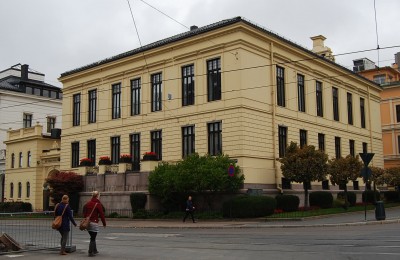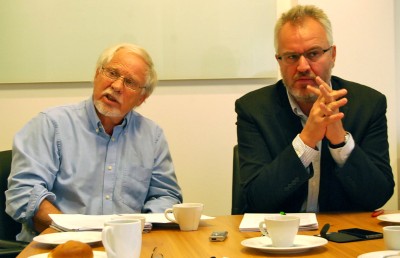As members of the Norwegian Nobel Committee gathered in Oslo this week to settle on a winner of this year’s Nobel Peace Prize, speculation flew once again over candidates. The guessing runs from Pope Francis to Edward Snowden but two local expert followers of the Peace Prize process think a Russian news organization defying authoritarian control is among the strongest possibilities.

The five-member Nobel committee reportedly met on Thursday and will meet again next week. That prompted Kristian Berg Harpviken, director of the Peace Research Institute Oslo (PRIO), to suggest that there’s disagreement among committee members. The prize is most often settled more than a week before it’s announced, he said, and reports that another committee meeting is scheduled for next week indicates members need more time to choose a winner. Harpviken told foreign correspondents in Oslo Friday that it was “extraordinary” for the committee to need another meeting so close to the day of the announcement next Friday.
Both Harpviken and Asle Sveen, a Norwegian expert on the history of the Nobel Peace Prize, met with the foreign correspondents for what’s become an annual brainstorming session on Peace Prize candidates. Both have compiled their own lists, but both include the Russian newspaper Novaya Gazeta for its efforts “to report the truth” about the Russian government’s intervention in Ukraine and other issues. Novaya Gazeta is best known for criticizing undemocratic actions by the Russian government and the war in Chechnya. Several of its journalists have been killed, including Anna Politkovskaja in 2006.
Harpviken criticized the Nobel Committee for failing to pay attention in earlier years to the growing repression, military build-up and increasingly authoritarian system in Russia in recent years. The Ukraine crisis erupted after the deadline for Nobel nominations in February, but Harpviken and Sveen contend that a prize to Novaya Gazeta could offset the committee’s earlier negligence. It could also pose a conflict for Nobel Committee Chairman Thorbjørn Jagland’s dual role as secretary general of the Council of Europe, which must work with Russia, but a majority on the committee would probably back such a prize.

Sveen’s top candidate is the now-17-year-old Malala Yousafzai for her struggle for the right for girls to be educated. The young victim of a Taliban gunman who caught world attention is also on Harpviken’s list as she continues to campaign around the world, speak at the United Nations and involve herself in support groups like those for girls kidnapped in Nigeria. A prize to Malala would be mostly non-controversial, and also send a message in the fight against extremism.
Harpviken revised his list on Friday to include, in the top spot, “The Japanese people who conserve Article 9” of the Japanese constitution, which renounces Japan’s right to engage in war or maintain military forces capable of engaging in war. Harpviken said such a prize would be relevant to simmering territorial conflicts with China, draw attention to east Asia and reward resistance of military build-up. Sveen agreed that awarding a Peace Prize over Article 9 would also “correct the mistake” he claims was made by the Nobel committee when it awarded the prize in 1974 to Eisaku Sato, a former Japanese prime minister portrayed as an opponent of atomic weapons who wasn’t. Harpviken claimed that the current government in Japan is “challenging the very spirit” of Article 9, which he says kept Japan out of the Korean War, has helped maintain peace in East Asia and sparked the Asian economic miracle.
Sveen’s personal favorite would be a prize to the ILGA, which seeks to end discrimination and hostility because of sexual preference all over the world. He doubts, though, that the committee would award the Peace Prize to an organization for the third year in a row, since last year’s prize went to the Organisation for the Prohibition of Chemical Weapons and the 2012 prize went to the European Union (EU).
Harpviken dropped Pope Francis from his list but Sveen kept him, in fourth place, because of his recognition of poor and underprivileged persons, his advocacy of compassion versus condemnation and moves to liberalize the Catholic Church. There’s been no Peace Prize winner from South America since Rigoberta Menchu in 1992 but Harpviken thinks the pope “hasn’t done anything remarkable” since February and should still be challenged on the abortion issue.
Much has happened in the world since Nobel nominations closed in February, not least the battle agains ebola, but neither Harpviken nor Sveen see a clear candidate for a Peace Prize winner tied to the ebola crisis. As for all the hype about US whistle-blower Edward Snowden as a Peace Prize candidate, they both support his candidacy and note that a prize to Snowden would assert the committee’s independence from the Norwegian government, which officially does not support Snowden despite the support he has within the population. Several high-profile Norwegians have advocated a Nobel Peace Prize to Snowden, who revealed massive spying by the US, but there are concerns he’d be arrested in Oslo if he came to accept his prize because he’s considered a traitor by the US government.
A prize to Snowden, in exile in Russia, could be used by Russian President Vladimir Putin for his political advantage, however, and that’s a message neither Sveen nor Harpviken think the committee would want to send. The fact that Snowden sought and received refuge in Moscow “is the biggest argument against him getting the prize,” said Harpviken.
The final candidate on both men’s lists: Dr Denis Mukwege, the Congolese gynecologist who’s been nominated by two Members of Parliament in Norway and has been a perennial candidate for his work helping victims of sexual violence. Dr Mukwege has treated thousands of victims of gang rape and torture during the brutal civil war that has raged for 16 years. A prize to Mukwege would turn attention to what Sveen calls “a forgotten war” that has killed millions in fights over minerals and ethnic conflicts.
Harpviken cautioned that despite all the top candidates, the committee could surprise everyone again with someone “Jagland pulls out of his hat.” This year’s Nobel Peace Prize will be announced at 11am Friday, October 10.
newsinenglish.no/Nina Berglund

